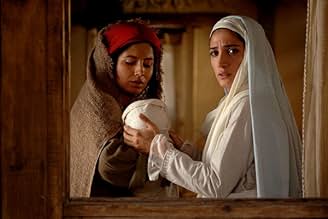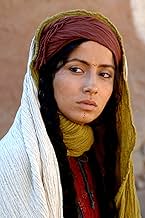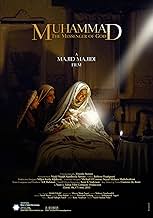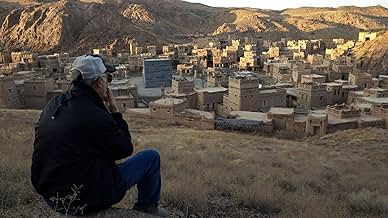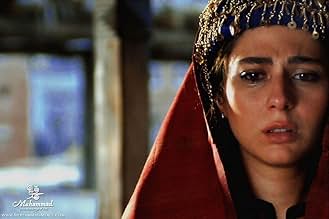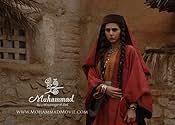Mohammad Rasoolollah
- 2015
- 2h 42min
CALIFICACIÓN DE IMDb
7.2/10
13 k
TU CALIFICACIÓN
Agrega una trama en tu idiomaThe events, trials and tribulations of the city of Makkah in 7th century AD.The events, trials and tribulations of the city of Makkah in 7th century AD.The events, trials and tribulations of the city of Makkah in 7th century AD.
- Dirección
- Guionistas
- Elenco
- Premios
- 1 premio ganado y 2 nominaciones en total
Baharak Salehniya
- Thowaiba
- (as Baharak Saleh Nia)
- Dirección
- Guionistas
- Todo el elenco y el equipo
- Producción, taquilla y más en IMDbPro
Opiniones destacadas
OMG THIS IS Absolutely BEST THING I EVER SEEN THAt before IN Islamic FILMS AND PROPHETs FILMS . music show u that hot sands and local people of that time and that region . it makes u too feel correct meaning of director ! this is for muhammad prophet kindly and show muhammad's mercy for people. all of people. decors was so nice and correct for that time,i enjoyed ! casts too ! i hope this trilogy can be one of the best movies we seen that before ! Hollywood CANT MAKE LIKE THIS POEM FILM ,NEVER. director made this film by his heart and love of muhammad and transport it to viewer. CONGRATULATION TO MAJID MAJIDI TO introduce MUHAMMAD PROPHET SUCCESSFULLY.
I have never left a review before, but after watching this movie in theaters (I am an international student in Iran) I really wanted to express my joy at it. The visuals and sound in the movie surprised me right from the get go; I did not expect them to be this good. There were perhaps some minor areas where there could have been some improvements (more post-production and editing related), but other than that it is definitely a must watch. I hope they get really professional dubbing or sub-titling done, as a lot of non-Persian speakers will be interested in watching this movie.
In terms of the story line, the movie tried to be as honest as possible - avoiding any blatant Shia-Sunni differences. It claimed to make use of historical reports that are famously accepted by both the sects and it more or less seems to have lived up to it.
In terms of the story line, the movie tried to be as honest as possible - avoiding any blatant Shia-Sunni differences. It claimed to make use of historical reports that are famously accepted by both the sects and it more or less seems to have lived up to it.
Beautiful movie.
A story of love and pain,of hope and fear,of life and death and of family,it's values and traditions.
The creator of this universe protected the Prophet Muhammad (PBUH) from the early childhood.
In this movie young Prophet Muhammad (PBUH) is shown minus his face,that point could create some controversy.So be aware of this fact before watching the movie.
I do cry at few occasions and smile when the small kid was named as "Muhammad"(PBUH).
Majidi is a king within the realm of art film, and he sure faced immense challenges managing the first Iranian cinematic project of this scale. The film immerses the audience in an orchestra of beautiful colors, Majidi's specialty, and an outpouring of sublime tunes. Juxtaposed with masterful cinematography of Storaro (although occasionally overdone), Majidi delivers imagery that satisfies aesthetic palates superbly.
The historical period drama, said to be the first part of a trilogy, focuses on prophet Muhammad's childhood. It is of note that, the filmmaker, working within the confines of Islamic conventions, cannot show Muhammad's face, which undeniably renders the project formidable. Hence, the point of view must be shifted, the story must unfold from distributed viewpoints, that must gel together skillfully in order to retain coherence. Though the story does justice vis-à-vis this challenge, it is far from perfection; the script does not mesh well with the visual artistry. The second act is stale, and the last act, though adequate, could be substantially improved. The CGI was noticeably weak; understandable, since it was the very first experience Iranian cinema went through, but still, within the given bounds, could be trimmed down and could easily be improved significantly. This evinces an odd feature of this film: the sense of perfectionism in this film is oddly inconsistent; some parts are perfected masterfully with amazing care, and a few are not even average. In addition to the CGI, the voice of Muhammad is an illustrative example: letting alone professional actors, I am sure that even among Iranian children doing TV commercials there are who are by far better voice actors, both in terms of enunciation and acting, than the kid chosen in this film for the role of Muhammad. What happened to the sense of perfection of the whole team there, I am not sure.
The film strives towards Shia-Sunni neutrality, and succeeds remarkably---unless viewed with absolute cynicism (anything can be deemed as biased if viewed from that lens). The focus is predominantly on the commonalities of the Shia-Sunni accounts, and the chosen story time---Muhammad's childhood---is certainly helpful towards that end. All in all, the film can be best characterized as "promising" (especially when held against the technological status quo of the Iranian cinema) regarding the potentials of cinema for engendering harmony and peace in our ominous and volatile times. It is definitely a must-see.
The historical period drama, said to be the first part of a trilogy, focuses on prophet Muhammad's childhood. It is of note that, the filmmaker, working within the confines of Islamic conventions, cannot show Muhammad's face, which undeniably renders the project formidable. Hence, the point of view must be shifted, the story must unfold from distributed viewpoints, that must gel together skillfully in order to retain coherence. Though the story does justice vis-à-vis this challenge, it is far from perfection; the script does not mesh well with the visual artistry. The second act is stale, and the last act, though adequate, could be substantially improved. The CGI was noticeably weak; understandable, since it was the very first experience Iranian cinema went through, but still, within the given bounds, could be trimmed down and could easily be improved significantly. This evinces an odd feature of this film: the sense of perfectionism in this film is oddly inconsistent; some parts are perfected masterfully with amazing care, and a few are not even average. In addition to the CGI, the voice of Muhammad is an illustrative example: letting alone professional actors, I am sure that even among Iranian children doing TV commercials there are who are by far better voice actors, both in terms of enunciation and acting, than the kid chosen in this film for the role of Muhammad. What happened to the sense of perfection of the whole team there, I am not sure.
The film strives towards Shia-Sunni neutrality, and succeeds remarkably---unless viewed with absolute cynicism (anything can be deemed as biased if viewed from that lens). The focus is predominantly on the commonalities of the Shia-Sunni accounts, and the chosen story time---Muhammad's childhood---is certainly helpful towards that end. All in all, the film can be best characterized as "promising" (especially when held against the technological status quo of the Iranian cinema) regarding the potentials of cinema for engendering harmony and peace in our ominous and volatile times. It is definitely a must-see.
Muhammad: The Messenger of God (2015) is an Iranian film written and directed by Majid Majidi. Cinematography was by Vittorio Storaro. Dryden Theatre of Rochester's George Eastman Museum has been honoring Vittorio Storaro, and that's how we were able to to see this movie. (The DVD was Storaro's own personal copy.)
Another reviewer has called this film, "A must-see feast of beautiful colors and tunes." That is absolutely correct. The screen is filled with color and action. The music is beautiful. The acting is outstanding. (We are never shown Muhammad's face, out of respect for Islamic tradition.) We see elephants, camels, horses, and sheep. Director Majidi gives us (literally) a cast of thousands. The desert scenery is spectacular.
Everything works, except that the actual facts about Muhammad's childhood are scarce. Director Majidi concentrates on miracles that Muhammad performs as a child. I've read a fair amount about Islam, and I've never seen any emphasis placed on Muhammad having supernatural powers when he was young. Muhammad was an orphan, and his life was challenging. Some of what was shown is probably historically correct, but I think most of it arose in the mind of writer Majidi.
One major problem for me is that the film is virulently anti-Semitic. As I understand it, Jews weren't involved in Muhammad's life. He accepted the God of Abraham, and he is considered by Muslims to be that God's true and last prophet. However, any violence he encountered was from opposing tribes, not from Jews. Maybe director Majidi is anti-Semitic. My guess is that this was the price he had to pay for the freedom to make this film in Iran.
The movie is three hours long. The good news is that it was never boring. The bad news is that it may have only a tangential bearing on the life of the Prophet Muhammad.
Another reviewer has called this film, "A must-see feast of beautiful colors and tunes." That is absolutely correct. The screen is filled with color and action. The music is beautiful. The acting is outstanding. (We are never shown Muhammad's face, out of respect for Islamic tradition.) We see elephants, camels, horses, and sheep. Director Majidi gives us (literally) a cast of thousands. The desert scenery is spectacular.
Everything works, except that the actual facts about Muhammad's childhood are scarce. Director Majidi concentrates on miracles that Muhammad performs as a child. I've read a fair amount about Islam, and I've never seen any emphasis placed on Muhammad having supernatural powers when he was young. Muhammad was an orphan, and his life was challenging. Some of what was shown is probably historically correct, but I think most of it arose in the mind of writer Majidi.
One major problem for me is that the film is virulently anti-Semitic. As I understand it, Jews weren't involved in Muhammad's life. He accepted the God of Abraham, and he is considered by Muslims to be that God's true and last prophet. However, any violence he encountered was from opposing tribes, not from Jews. Maybe director Majidi is anti-Semitic. My guess is that this was the price he had to pay for the freedom to make this film in Iran.
The movie is three hours long. The good news is that it was never boring. The bad news is that it may have only a tangential bearing on the life of the Prophet Muhammad.
¿Sabías que…?
- TriviaThis movie will be part of a trilogy. Muhammad will never be shown in any of the three films for the respect of his character. This is specifically done in all media in Islam countries to avoid idolization of a renown character to an actor's face. Instead, he is meant to be known by his religious and historical personality profile.
- Citas
Abdul Muttalib: There is nothing futile in the sight of God.
Selecciones populares
Inicia sesión para calificar y agrega a la lista de videos para obtener recomendaciones personalizadas
- How long is Muhammad: The Messenger of God?Con tecnología de Alexa
Detalles
Taquilla
- Presupuesto
- IRR 120,000,000,000 (estimado)
- Total a nivel mundial
- USD 1,440,044
- Tiempo de ejecución2 horas 42 minutos
- Color
- Mezcla de sonido
- Relación de aspecto
- 2.00 : 1
Contribuir a esta página
Sugiere una edición o agrega el contenido que falta

Principales brechas de datos
What is the Spanish language plot outline for Mohammad Rasoolollah (2015)?
Responda

